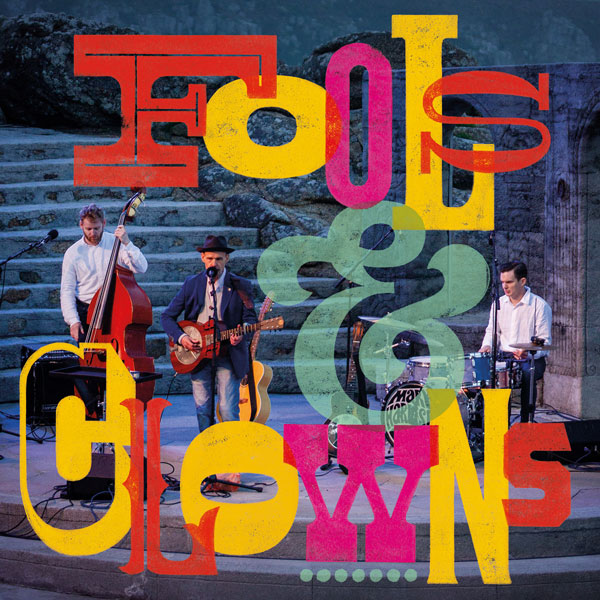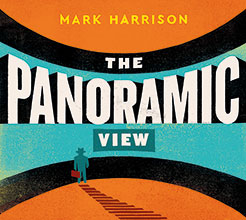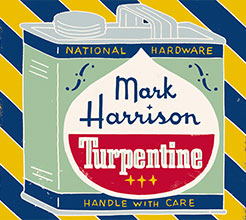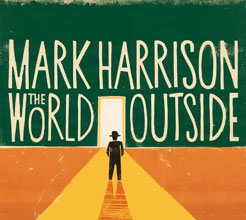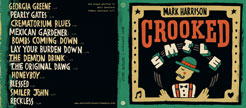What people say about Mark

-
WHAT PEOPLE SAY ABOUT MARK

BBC RADIO 2
Cerys Matthews
‘A bit different and kinda groovy too
You can see Mark, he’s got a massive tour in the diary …I don’t think you stop do you Mark …. you can see him on his never-ending tour
I do love that one, that’s Mark Harrison’s Passing Through …. quite poignant really …’
Paul Jones
‘really excellent … he takes very real things, normal things that happen in life, and he writes about them in a way that makes you think afresh about them’
Frank Hennessey
‘The more I listen to Mark Harrison, the more I admire the man. He's a fantastic musician, he's got a great voice and what a songwriter! He's kind of reinvented the blues in this country. What a glorious sound he makes
one of the top blues men in the UK with a big following and rightly so
a very very clever writer and a top class performer
I love the quirkiness of that guy’s writing in particular, fantastic
songs this interesting from an artist this good is what makes the world go round
Brilliant … that is one cool cat, and I think he’s just a wonderful writer, he has a unique style.’
CLASSIC ROCK MAGAZINE
‘Everybody should be talking about Mark Harrison
the folk-blues songwriter’s graceful dance across the frets of his resonator is met by lyrics that are wry, clever and kind
one of British roots’ best
Mark Harrison keeps getting better
breezy folk-blues vibe belies barbed lyrics’
RnR MAGAZINE
‘Charismatic live performances
he acutely observes life with wit and considerable compassion, to create memorable songs.
superb musicianship, melodic songs and humorous banter
fresh and stimulating
roots music from the top drawer from one of our most gifted talents’
MUSIC NEWS

‘The playing is of the sort of standard that most players take years to fail to achieve…… He is a unique musician, and I really don’t think that there is a musician that can hold a candle to him at this time
he plays beautifully and writes songs that both move the listener and produce a wry smile … he creates a bond between singer and audience that is rare in this day and age
songs that are relevant and modern, with the feel of classics
songs that will pull you in to the stories … the songs are the real stars
Mark Harrison is a unique, and very British, songsmith, and the band he has around him create a wonderful sound that perfectly matches his exquisite lyricism
Harrison tells stories and there is something in every song to tell a tale or illuminate the human condition.’

Blues Matters magazine
‘Probably our most original, innovative home-grown acoustic blues talent these days
one of the UK’s truly inspired and original bluesmen
one of the UK’s finest modern-edged bluesmen
one of the most genuinely innovative bluesmen in Europe today. Always a joy.’
Also ...
Totally and absolutely original
(Mike Harding)
Mark Harrison is approaching “national treasure” status in the UK.
(Blues Blast magazine, US)
Great songs
(Acoustic Magazine)
Perhaps all you need is empathy for other people’s lives. Mark has that.
(Folking)
Fresh as morning sunshine and as sharp as a well-honed razor
(Folkwords)
Singular lyrics …an original take on song writing
(Blues in Britain magazine)
He has a wonderful ability to take unexpected subjects, twist and tune them up with humour, innovation and downright originality
(Cashbox Canada/Elmore Magazine US)
Uplifting, thought-provoking, entertaining and distinctly different.
(Blues Blast magazine, US)
With a highly distinctive style and a growing international reputation, combines superb picking and slide work with richly burnished vocals and inventive original material
(Celtic Connections festival programme)
The roots music genre at its most vibrant and life-enhancing
(Messenger Newspapers)
Between the songs he had everyone laughing their heads off, I’ve never seen that kind of level of interaction from an audience anywhere.
(Blues Is The Truth)
Combining early acoustic blues and folk influences with a very modern lyrical perspective and a contagious energy and good humour to create something new and highly enjoyable
(American Blues Scene)
A master singer, songwriter and guitarist
(American Roots UK)
There’s no one quite like Mark Harrison for making you look afresh at your (and everyone else’s) troubles and maybe dance and smile your way through them
(Plunger)
Compelling story-telling and wry humour … a troubadour, whose music making is fresh and original and whose songs are clever and compelling … he excels at intriguing you
(Down at the Crossroads)

Such influences as Mississippi John Hurt, Eric Bibb, Guthrie and Blind Willie McTell.
(Folk Radio UK)
Overtones and a nodding of styles to Dylan
(Blues Matters)
He often sounds like a cross between Ry Cooder and Little Feat
(Blues & Rhythm magazine)
Mark Harrison has a refreshing and totally individual style.(American Roots UK)
Timeless-sounding, self-penned songs that largely comprise sanguine, often significantly wry philosophical observations on contemporary life
(FATEA)
Paints images in your mind. You get these beautiful, folk ballads and old-fashioned sounding folk songs, and they leave you with pictures.
(American Blues Scene)
Each song is a carefully arranged revelation
(Penguin Eggs, Canada)

Gives tremendous value at his gigs
(Maverick magazine)
Perceptive, empathic and often wry commentary, often (cleverly) from another person’s viewpoint, that makes you think again about the realities and tribulations of life
(FATEA)
Songs that provide a relevant, conversational, sometimes playful commentary on contemporary life, often with an underlying political edge but reflecting rather than sloganeering or preaching and likely quite subtle. And stylish too, dealing authentically with real issues
(FATEA).
He is very far from a clone of anyone but both men's (Mark and Ry Cooder) original guitar sound and ability to invent their own genres that borrow from myriad roots styles is what links them and sets them apart from others.
(American Roots UK)
There is a thoughtfulness and maturity in his work that is all too rare in today’s music industry, but there is humor and compassion too.
(Blues Blast magazine, US)
You can sing along to it, smile wryly at Mark’s humour or contemplate the more serious lyrics. Or just enjoy the foot-tapping music.
(Folking)
These are songs for dark times leavened with a touch of optimism and a big wedge of gallows humour.
(Folking)
The definition of a modern blues artist; one that many aspire to, but few achieve
(bluesdoodles)
The lyrics are rather clever and the guitar is an absolute treat
(bluesdoodles)
This unique character’s memorable musings on the human condition
(Messenger Newspapers)
Harrison offers up a mirror to our troubles and challenges, and, while he might not be able to solve them, he still makes us smile as we go through them.
(FRUK Folk Radio UK)
Songs that transport you to another place, make you contemplate the world around and, as well as that – most importantly – entertain you.
(Down at the Crossroads, Best Blues Albums of 2021)
INTERVIEWS & FEATURES
BLUES IN BRITAIN MAGAZINE – 3-PAGE FEATURE/INTERVIEW
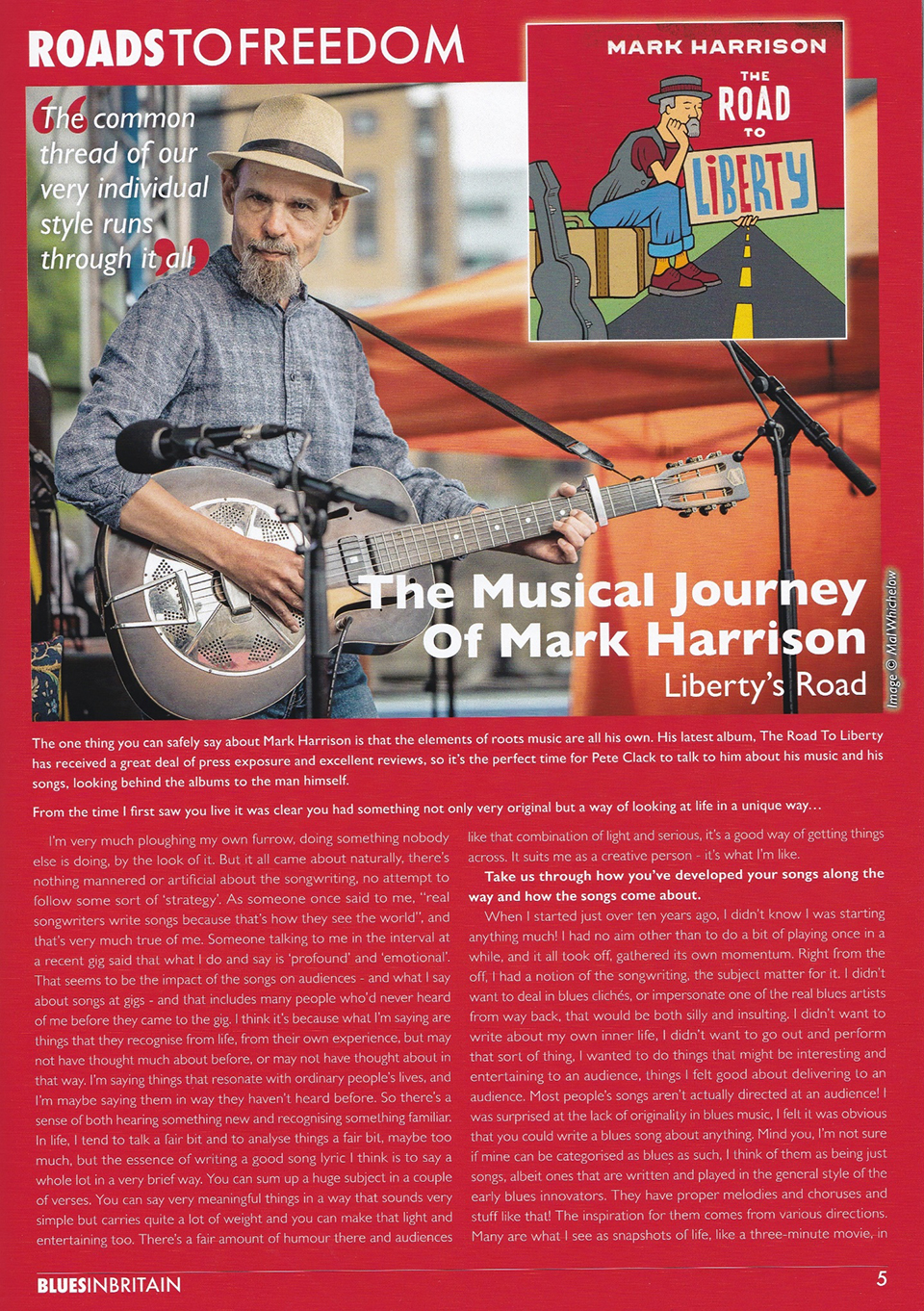
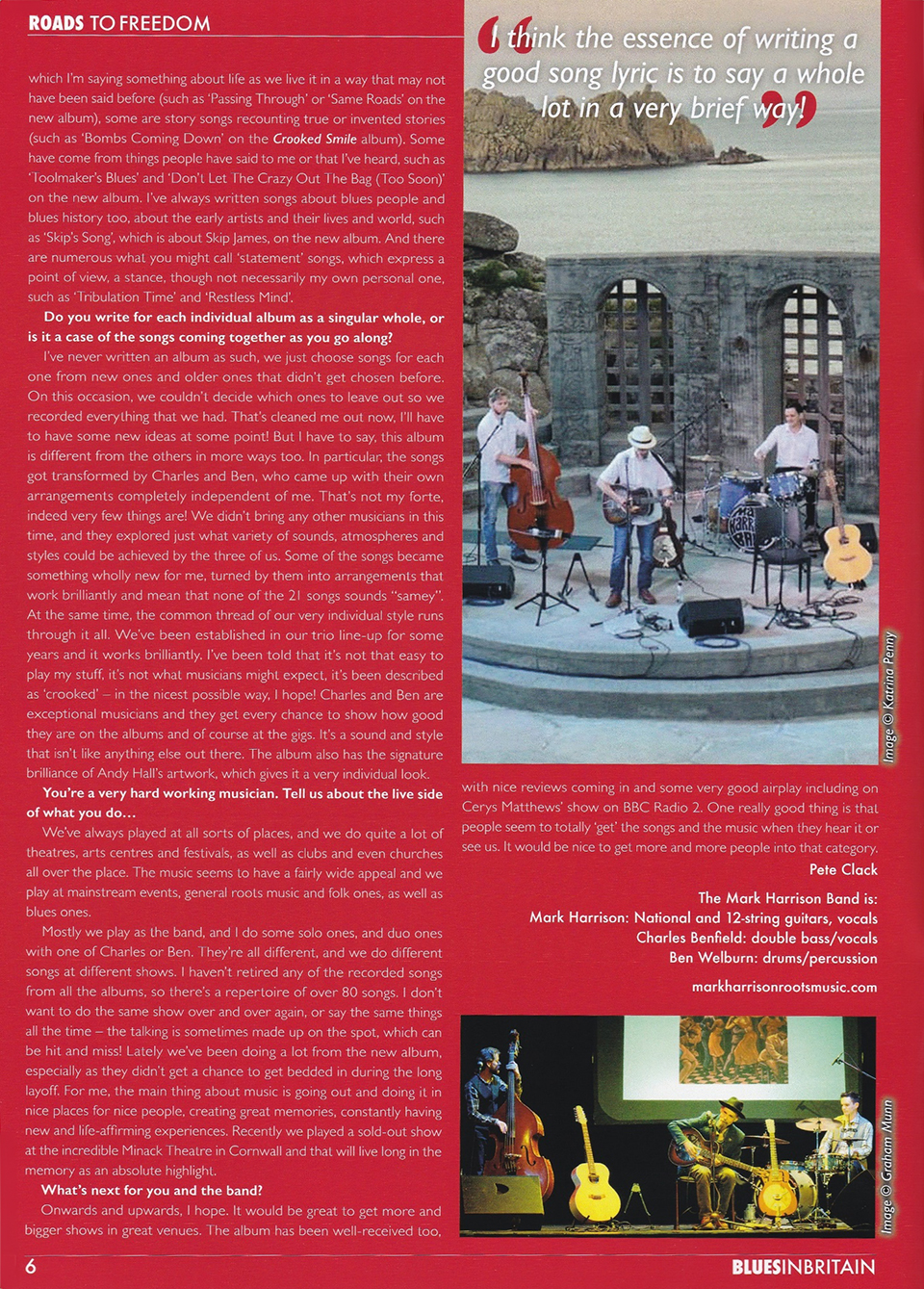
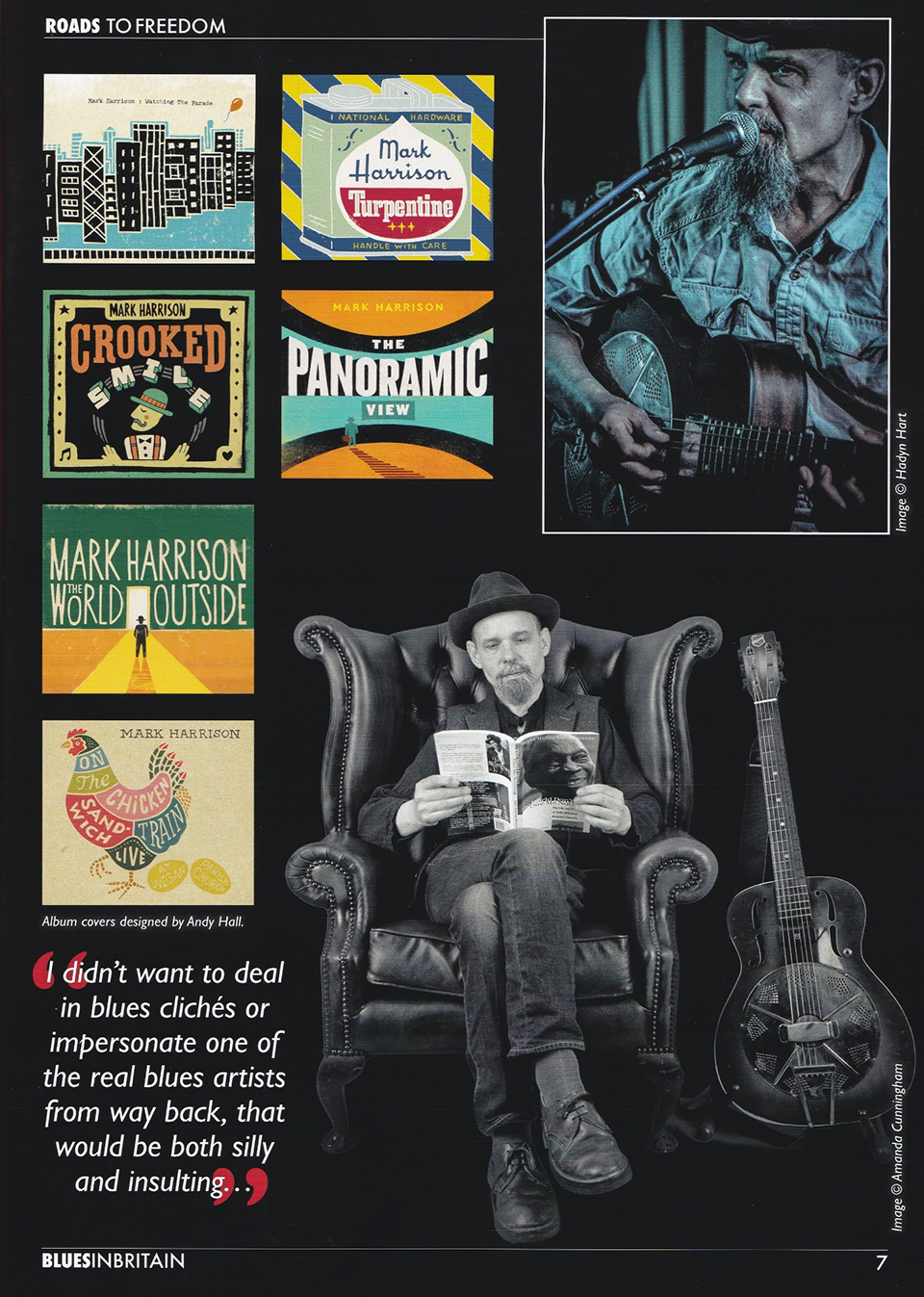
INTERVIEW/FEATURE – DOWN AT THE CROSSROADS
The Unique Talent that is Mark Harrison
“Rapidly becoming a British national treasure.”
Blues Blast MagazineMark Harrison’s sixth album, The Road to Liberty, showcases his adept story-telling and clever lyrics, his knack for composing a catchy tune, and his never-less-than-engaging performance as a singer and guitarist. He’s hard to pigeon-hole, not quite blues, but blues never far away, somewhere in the folk-blues-country continuum.
That’s not a bad thing, given the unique talent that he is, able to write songs that transport you to another place, to make you contemplate the world around and, as well as that – most importantly – to entertain you.
Harrison is an English singer songwriter, who plays a nifty acoustic guitar, who has been delighting audiences over the last ten years with his carefully crafted songs and witty banter. He was a late starter as a professional musician, not picking up a guitar and singing until his fifth decade, but he’s made up for lost time, touring the country and supporting such artists as The Holmes Brothers and Doug MacLeod, along with major festival and radio appearances. He’s also released now six albums, all of which have been eagerly received and critically acclaimed. If you haven’t come across him as yet – put that right straight away and grab yourself a CD or download.
You could start with The Road to Liberty, a double album of 21 songs, featuring Harrison and his two bandmates, Charles Benfield on double bass and Ben Welburn on drums and percussion.
I got chatting to Mark about the new album and his musical journey. His previous albums, he told me, had been the “standard studio procedure of layer upon layer,” but that the band had felt that this album ought to reflect much more Mark’s live performances – “this business of singing your songs, standing up in a booth with headphones on, when do you ever do that in real life?”
A double album is a little unusual these days, and I wondered how that had come about. Mark said that he’d a lot of songs in the bank, so to speak, and, although he thought they’d only choose the standard 12 or 13 songs, the band like the lot of them, “so we thought, well, let’s just record them all. So, I’ve actually cleaned out everything I’ve got now!”
I remarked on the quality of the album’s cover and artwork – so often you get flimsy, pared back packaging these days and you wonder why you didn’t just buy the download. The Road to Liberty, however, feels quite luxurious.
“Well, it’s Andy Hall, who’s done everything for me from the very beginning. He and Rick, his business partner, ran a website called Blues in London when I got started, which was a sort of central thing for the blues scene in London. That’s how I met them, doing jams down at the Green Note in Camden. So when it came to do my first album, they said they’d like to do the cover. And so, it’s gone on from there and Andy does really wonderful things that make everything look great.”
The album has more of a band feel about it than some of Harrison’s previous albums. Charles Benfield and Ben Welburn, Mark’s two band members, are very talented musicians, whom he met on the blues jam scene at the very beginning of his career. They’ve been playing as a settled trio since around 2017, and sound a very solid and tight little outfit.
Mark does some solo gigs as well, depending on the venue and the promoter’s budget, but increasingly, it’s the trio. “I’d say it’s more fun when it’s the three of us.”
The album’s title, The Road to Liberty, is intriguing and one reviewer rather poetically suggested that it describes a “set of observations set to the heartbeat of humanity which exemplify the struggle of narrative freedom being taken seriously.” The phrase occurs in the song Restless Mind, a clever, jaunty number, with the band in full flight, which takes an ironic look at what happens when you let your mind become too restless.
“Well, I always take a phrase from a song, not a song title. So all the albums have a phrase or a word that is in one of the songs as the title of the album. I felt that I wanted a title that reflected some upbeat message because, in my opinion, the music generally speaking has an upbeat message in the words, even if it might not appear that at first glance.”
For sure, the tunes in the album are very upbeat, very optimistic sounding. At times they almost seem to belie the lyrics, a deliberate ploy by Harrison: “I’ve always felt that the music itself is uplifting or is meant to be, so you have perhaps a contrast between what is often a jolly tune, with what might be called slightly acerbic lyrics. And I think that’s probably where I’m at.”
As you listen to the songs, you’ll find yourself in turns amused, intrigued and puzzled. I asked Mark about one song in particular, which is great fun and had piqued my curiosity, Don’t Let the Crazy Out of the Bag (Too Soon).
“A woman friend told me a little while ago that if she was in a successful relationship that was going well, she would often find that the worst possible thing she could say would pop into her mind. And yet knowing that, she would find herself saying it! And then there came a point where she got engaged. But later I noticed on social media that she was no longer engaged. So I asked her about it. And she wrote, ‘I think I let the crazy out of the bag too soon.’ “And that one does have a happy ending by the way! It’s like a lot of things, you come across a phrase and you think it has a much more general application perhaps than the context in which you’ve heard it. And so, as well as that being a bit of fun, I thought that was a suitable subject for a song.”
Mark Harrison’s songs typically address a wide variety of situations and snapshots of life – on this album, you’ll find a song about the life of Skip James, Skip’s Song, a song about working in a factory in an economic downturn, Toolmaker’s Blues, and one about a poor guy on trial before the judge, All Rise. As you listen to this set of all-original songs, you can’t help but pick up echoes of blues music. Harrison plays a National resonator and has a cool kind of bluesy, picking style. You might expect him to throw in a few old blues songs, but that tends not to be what he does.
Mark told me that when he first got started, he tried to work out a few old blues tunes on the guitar, but found he couldn’t do it. The second song on the album, Everybody Knows, is a nice guitar-driven song in a Mississippi John Hurt style, but Mark said it was actually the first song he wrote using the 12-string and he had thought at the time he was working out Blind Willie McTell’s Statesboro Blues. “So the short answer is, I don’t do covers of them because I’m not capable!” (Unlikely, Mark is an accomplished guitarist.)
Mark’s back story as a musician is a remarkable one. He’d played guitar seriously in his youth, but only returned to it much later in life, about eleven years ago.
“I got this guitar shortly before I started in 2010. And that transformed everything. I had absolutely no intentions at all of launching it into anything. I didn’t expect to make an album or do a gig, and so for a little while, I just went and played a little bit at jams and it was a social thing. But the London blues jam scene is pretty good – a bunch of really good people and very high standards. So then, I’d written some songs and I thought I’d commit them to posterity and that was the first album [the acclaimed Watching the Parade]. I had no inkling of what would happen. It sounded okay to me. I put it out there a little bit cautiously and I got a few gigs and it built from there. So it’s a rare case of something in life that’s just taken on its own momentum. And it hasn’t been a big struggle!
“One of the advantages of the changes in society in my lifetime is that it doesn’t matter what age you are with music. In fact, the acts most likely to sell tickets and do main stage at festivals probably have an average age that’s pushing 70! Most theatre listings of music and festivals are all about nostalgia. So, the idea that you couldn’t be doing this at a relatively older age, that doesn’t exist. Which is pretty good.
“And people with my musical background would tend to be what you call old school, which is that you’re not going to go out there and inflict yourself on people then unless you’ve worked out something that’s of a really high level professionally. So I carry that sort of attitude with me.”
We chatted a bit about the economics of being a musician and how embarking on a career or going out as a professional musician is a pretty uncertain enterprise.
“It’s pretty obvious to anyone involved that the demise of recorded music as a commercial enterprise has had an enormous effect. In the past you could shift a lot of albums, but by the time I got started, that ship had sailed. So you need to form your plans realistically with that in mind. I do really pretty well for someone that wasn’t established many years ago. But in terms of making money, nobody is.
“I used to listen to radio when there were a limited number of radio shows and I would buy albums straight off hearing people on, say, the Paul Jones show and others. Now I’ve been on those shows subsequently, and I think in the past, if you got played there, let alone did a session, like we have, that would have led to very significant sales of your albums. But these days it doesn’t. So there’s no point complaining about that. That had already kicked him by the time I got going. So it’s a question of understanding the environment you’re operating in and being realistic. There’s no point being in music if you’re going to complain about not being famous.
“For me, it’s going out and playing, the audiences, the people that come up and talk to you, the places that you go, the experiences that you have.”
Part of Mark’s story is acquiring a guitar previously owned by Eric Bibb, whom he admires a great deal. “I started to listen to music again about 2000 after a long time of not listening to anything. I saw in the gig listing of one of the papers, “Eric Bibb, Sublime Bluesman.” I thought, I didn’t know there were any sublime bluesmen still alive. So, I went to see him several times and I thought what he was doing was great. And it showed you that you could get a really great big sound with a band that had an acoustic guitar leading it, not an electric guitar and someone pulling faces.
“Years later, I went to a shop in London – it doesn’t exist anymore – The London Resonator Centre and I thought I’d buy one of these guitars. They got me trying out some of the new Nationals, which are great. And then the guy running the shop said, ‘Ah, the way you play, you might like this that’s just come in.’ And he said that Eric Bibb had just brought it in. So I ended up getting that and subsequently I’ve met Eric numerous times, and he always hails me whenever I go to one of his gigs – “Mark!” from across the room.”
If you like acoustic blues music, you’re almost bound to appreciate Mark Harrison, even though his music can’t be pinned down to simply that genre.
“I think that I’m in the tradition of those guys that called themselves songsters. Back in the twenties and thirties, they would do a whole variety of stuff. I mean, if you listen to the full output of Robert Johnson, very little of it, actually, is what would now be called blues. Variety and entertainment were the key factors. So I’m in that tradition.
Entertainment is certainly what you get with a Mark Harrison performance and with a Mark Harrison album. But it’s not just entertainment. He’s a thoughtful artist who appraises life’s peaks and valleys and converts this into stories with wry and incisive lyrics, but never short of compassion. He’s a unique talent and one you ought to be familiar with.
BLUES PEOPLE SHOW – INTERVIEW/FEATURE
Blues in Britain magazine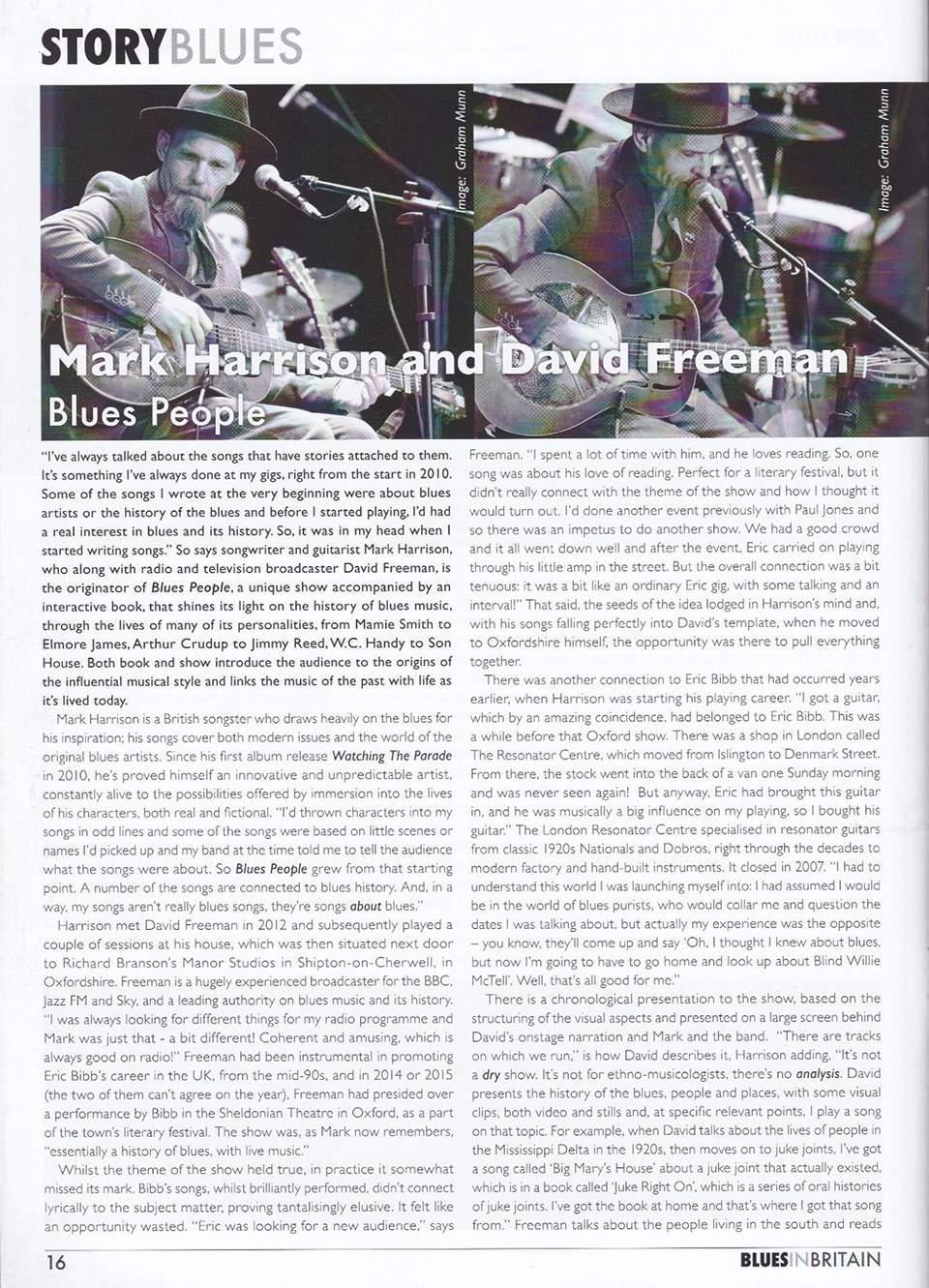
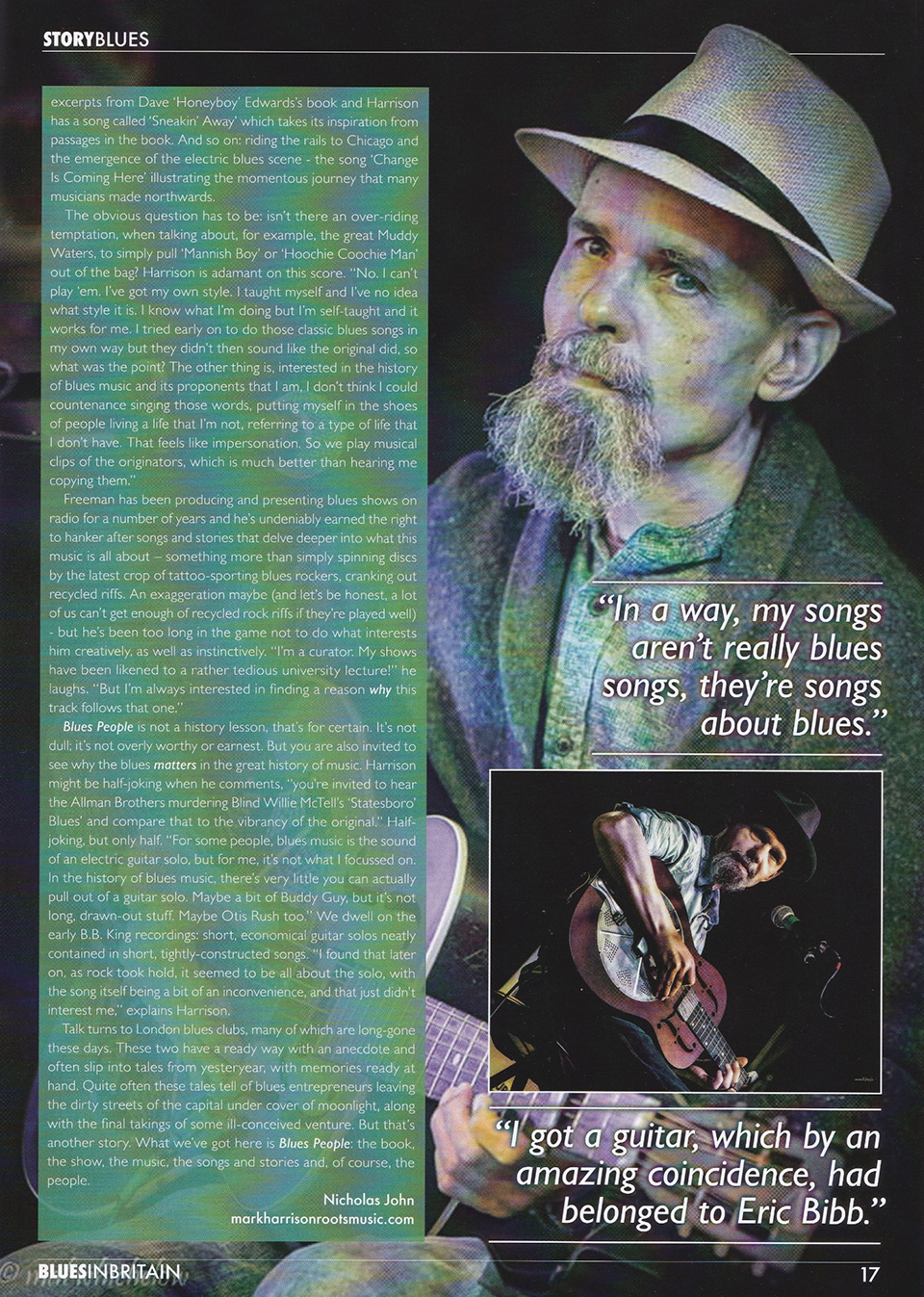
BLUES IN BRITAIN – STORY OF MY GUITAR
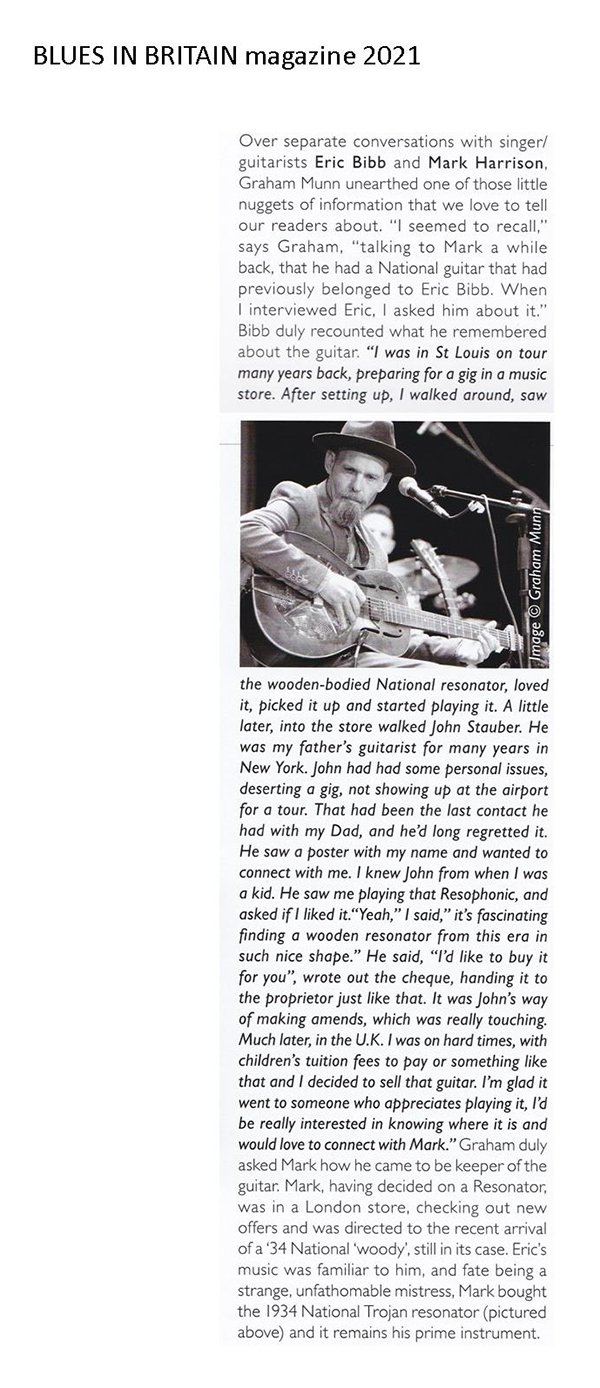
Blues People Show preview
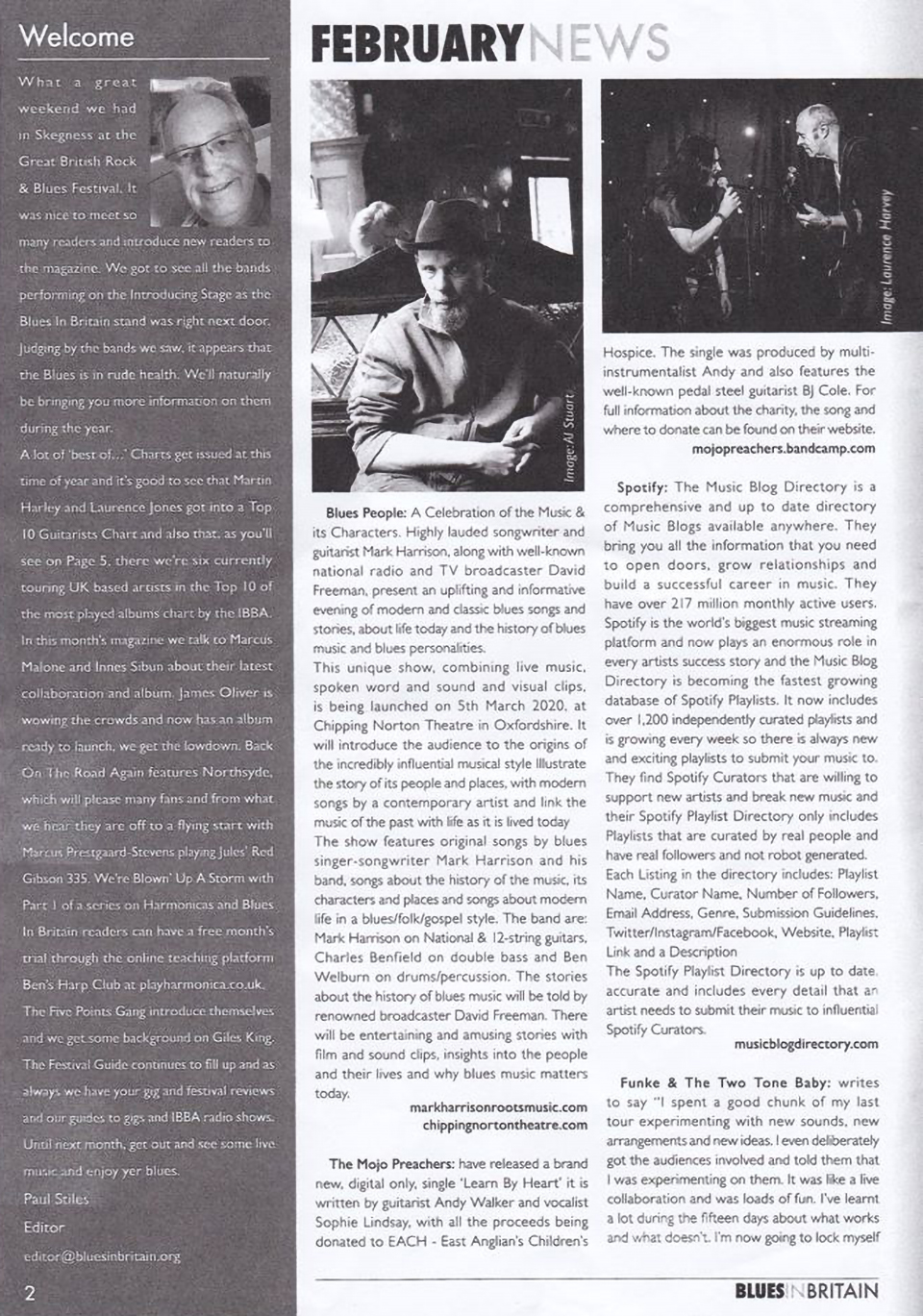
LIVE REVIEWS
THE MINACK THEATRE, CORNWALL
Blues in Britain magazine
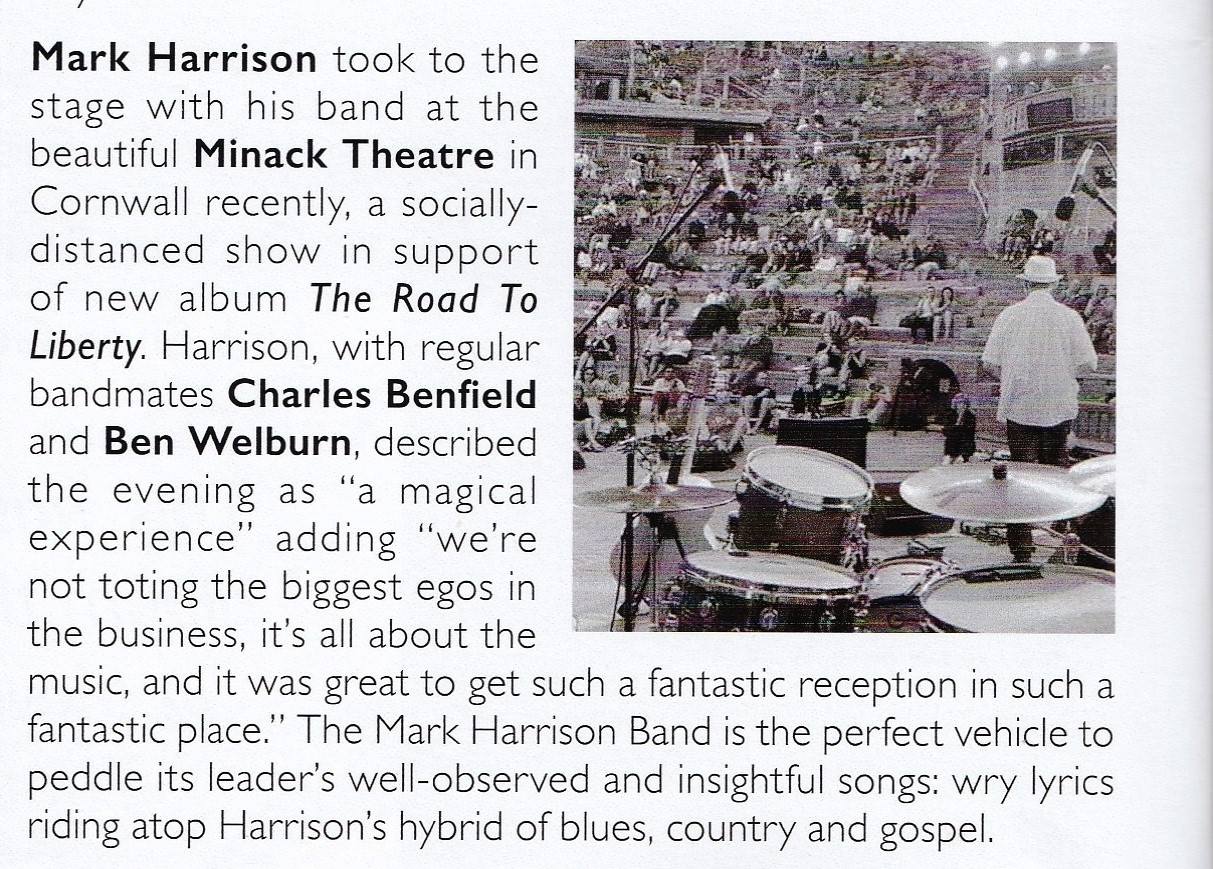
THE MINACK THEATRE, CORNWALL
Review by Jenni Balow
Mark Harrison played his own brand of electric blues that was finger-pickin' great on a hot summer night that might have been in Memphis or on the Mississippi . . . but was at the Minack.
The acclaimed songwriter, known for his uncompromising 'tell it how it is' descriptions of life in the Delta and much closer to home, released his aptly-named album, The Road To Liberty, this month.
He came West with two members of his band, Charles Benfield, who plays compelling double bass rhythms, sometimes sawing at the strings with a bow, at others, hammering out an urgent beat with his hands.
The trio was completed by Ben Welburn on drums and percussion, with washboard at the ready, watchful and quick to respond to the quirks of Harrison's delivery.
The self-taught guitarist caresses sweet sounds with a bite from his beloved 1934 National Trojan guitar, playing all his own original songs on both 12 and six strings, with wry and dry ease. There are more than 70 to choose from.
We got the drift when he introduced the first of many, the "uplifting" lyrics of Panic Attack, and telling us that he specialises in subjects that people may never write songs about, including Crematorium Blues, On The Chicken Sandwich Train, Black Dog Moan and Doing Time.
World War II was right up there as well, with Bombs Coming Down, a tribute to his Dad's National Service when his home town of Coventry was being blitzed.
He wrote The Demon Drink after quitting alcohol some time ago, something he jokingly didn't recommend in the light of being sober enough to appreciate how much it p..... him off.
His intriguing songwriting and story telling has been recognised with several nominations for UK Blues Awards and his individuality has been featured by the BBC's Pick of the Week programme.
He reckons the history of the Blues "created all the music you have ever liked, if you are a half-decent human being" and he is well on his way to reminding us how great it is, with a 21st century slant.
One of his latest songs is Don't Let The Crazy Out The Bag (Too Soon) - on The Road To Liberty - we all go along with that.
https://www.minack.com/past-shows/mark-harrison-0
BLUES PEOPLE SHOW – CHIPPING NORTON THEATRE
Mark Harrison, Blues People, with Narration by David Freeman

This promised to be an evening with a difference, a last-minute call to the lovely old temperance hall in Chipping Norton, now in service as a small, but ambient theatre, to take a few pictures at the event. A bit of a trek, but it proved to be a very interesting and enjoyable evening. The purpose, was to launch a book, written by David Freeman, signposting the story of the blues, and the people who shaped what we recognise today in the blues musical arena. To bring the book to life, Mark Harrison with his band, drummer, Ben Wellburn and double bassist, Charles Benfield, would be breathing life into the style and stories of the blues, through Mark’s own song book. Mark’s music gives traditional porch and juke joint blues, a more modern perspective.

David opens the story, with background projections of plates used in the book, the first known recording by Mamie Smith singing into a trumpeted recorder, WC Hanley, stumbled on blues slide, using any metal object to hand, whilst traveling, Mark dutifully demonstrated. Hanley committed it to his music book, and eventually, ‘Yellow Dog Blues’, which was recorded by Bessie Smith, bringing her fame and fortune. David turned to share cropping, and Mark’s first song, based around the croppers letting go on a Friday night, ‘Big Mary’s House’, slipped out, along with Mark’s atypical slice of humour.
David ‘Honeyboy’ Edwards, was unusual for the cotton fields of the South, in having lived into his 90’s, resulting in a ‘bible’ of life in the deep South for black workers. Time for Mark to go, ‘Sneakin’ Away’. Basic guitars, gave way to resonators, to boost there sound, with coming of thermionic valves, electric amps arrived, as well as recording sessions. David Freeman, moved through the blues greats, Paxton, Robert Johnson, Blind Willie Johnson, and Muddy Waters, time for a 40’s reflection on the migration of unemployed cotton pickers, ‘Changes Gonna Come’, with its railroad rhythm, laid by Ben and Charles. The inequality and degredation suffered by the descendants of black slaves, depicted in Mark’s, ‘Ain’t No Justice’, bringing up a break.

Electric guitar, brought a ‘new’, crop of musicians, like Hooker, and Elmore James, Muddy adopted the new sound. Columbia records had not forgotten Robert Johnson, and his music was collected together for an album, leading to a blues revival. Mark gave the continuing story life with his compositions, like,’Rediscovery Blues’, ‘What Son House Said’, and the juke joint skiffle of, ‘Shake This House’, all interspersed with the deadpan humour that Mark delivers so easily. Slipping nicely into all that, Mark’s background, growing up in Coventry, led to the delightful riff of, ‘Bombs Coming Down’, blues of a different nature, maybe not the cotton fields, more a case of wrong place, wrong time. To close the evening Mark, Ben and Charles, stressed out with, ’Panic Attack’, Ben’s sticks rattle against the rim, the bass thumps away, its a madass journey, which you can find featuring in a video link on Mark’s website.
Its difficult to capture an evening like this, all I can say is, if it comes your way, just go, there’s much to learn and much to enjoy, not least the humour, the songs, and a very worthy book from David Freeman, full of excellent plate pictures of some of those greats from the past.
https://rhythmbooze.tumblr.com/post/612482614094430208/mark-harrison-blues-people-with-narration-by
DISEWORTH BLUES
Blues in Britain magazine

DISEWORTH BLUES
Mark Harrison, Starts The Wheels Going Round

Its hard to credit that the last Live gig I went to, was responding to a request to ‘cover’ Blues People (a book launch, reviewed elsewhere on this very site), with Mark Harrison providing the musical illustration. That was back in March ‘20. Now, I’d found my way to the oft overlooked metropolis of Diseworth, with its own international airport and community venue, home to the renowned Diseworth Blues Club, The stage was set for Mark, bassist, Charles Benfield, and drummer, Ben Welburn, a pair of National resonators, double bass, moderate drum kit, and a fistful of slides, awaited the trio.
Enthusiasts had already gathered, generously supporting the exclusive bar, perhaps lending witness to the off beat asynchronous hand clapping, until Ben abandoned his sticks, stood and reset the timebase, appealing with outspread arms! But I’m jumping ahead of myself.
Mark lifted his vintage Trojan, and led the band into, ‘Tribulation Time’, (maybe that’s what discombobulated the later attempts, keeping time with the rhythmic beat of, ‘The Chicken Line’?) Timing however, was bang on for the slow staccato thump of, ‘Doing Time’, or as Mark explained, akin to doing a speed awareness course here in Blighty. Ben thumped in the slow beat, as Charles slapped his bass up..
It wasn’t long before finding common ground for Detroit and his own Coventry, with a lament to the demise of the car industry, ‘Toolmakers Blues’. Harrison’s sardonic and dry humour unwrapped the stories behind his songs, as he continued just, ‘Passing Through’, working his way to a short break for air, and signing a few CD’s, but ‘I’m Damned’ if there isn’t a faint hearted sing along before the plug is pulled.
We’re into the second set, and the scene is set for, ‘Long Gone Miles’, chauffeur, and booze buddy of Mr Cool, Lighting Hopkins, all revealed in Mark’s delightful song. Charles is caressing that big buxom bass, whilst Ben is sticking it to the drums, tapping up the rim or swotting flies with his brushes, as the band keep the, ‘Wheels Going Round’. Stopping briefly at, ‘Big Mary’s House’, with some great bass from Charles, to pull the cork on a bottle of dubious hootch and a knees up. In the spirit of an even report, I have to, ‘Go Nice’ and mention Ben, its a fact that drummers have a partitioned brain, 4 different departments doing there thing, but Ben is a percussionist. He opened another door, taking out a washboard to tuck under his arm, with thimbled fingers busy, he used his whisk to scratch those itchy skins.
All this was a bit of a shock, after such a long suppression of Live music, inevitably, it drove the early onset of a, ‘Panic Attack’, the rhythm lads get the chance to let rip a little as we raced toward the end, as they, ‘Shake The House’.
The new found freedom had everyone drunk on the atmosphere, copious beer and wine may also have helped a little, but for sure, we have all, band included, missed our live music. Mark Harrison, his band, and Diseworth Blues Club, had come together for a glorious reawakening, and just a glimmer of hope for the future, and we all need that.
Words & Photo Graham Munn
https://rhythmbooze.tumblr.com/post/657712782281768961/mark-harrison-live-diseworth-blues-club
Everyman Theatre, Cheltenham
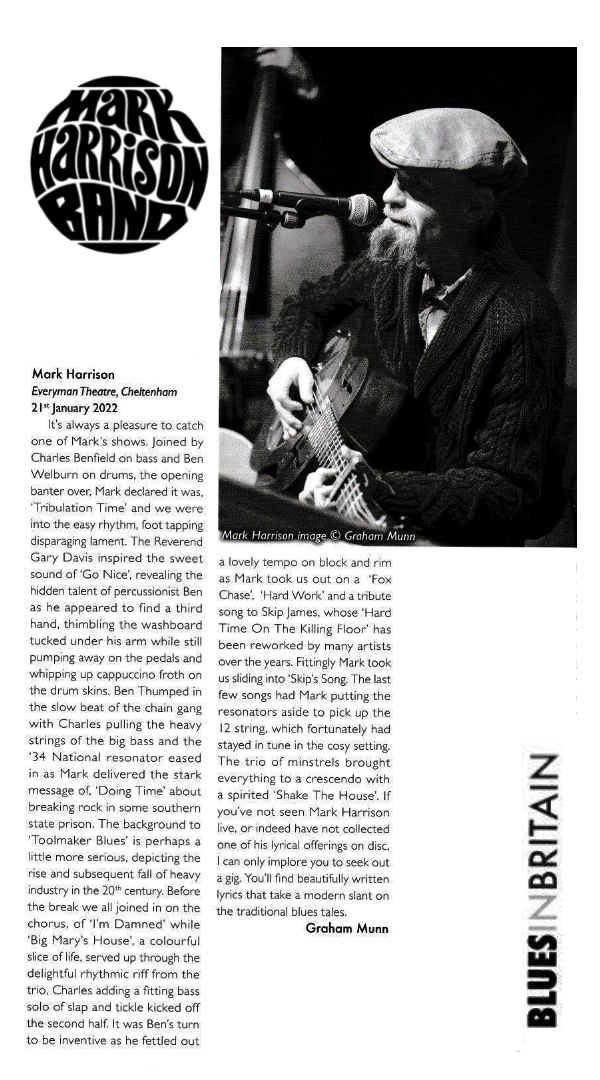
ONLINE CONCERT Blues in Britain magazine

Arlington Arts Centre, Newbury
Next up was Mark Harrison, appearing solo and acoustic tonight, with his distinctive and highly individual compositions. A hugely accomplished guitarist, Mark has a great line in repartee and his songs, inspired by the itinerant black bluesmen of the 1920s and 30s often feature subject matter than many shy away from. Highly interesting and unique. I particularly enjoyed Tribulation Time, Go Nice, a quote from the Rev Gary Davis (who taught/mentored Bob Dylan) and Turpentine.

Mark, picture Brian Harrington
GREEN NOTE, LONDON
Plunger

“Si vous vous sentez seul quand vous êtes seul … vous êtes en mauvaise compagnie”.
Plunger don’t know if Sartre played guitar, but Mark Harrison can definitely do existentialism, so he may have had the Frenchman’s aphorism in mind at his show at the Green Note. After playing to a three-figure crowd near his new(ish) home in the Cotswolds he might have been a little disappointed at the turnout at his musical home (it being where he launched his career just over a decade ago) barely breaking double figures: but he took it very philosophically, “… we’re in the new music business where you can say, ‘the smaller the audience, the better the act.’”
Shockingly, Plunger last caught Mark live roughly around the time he left London for rural splendour four years ago, consequently this was our first show post-release of his excellent Road To Liberty Parts 1 & 2, from which much of the set was drawn (although not exclusively) delivered with the customary precision and aplomb by Mark, Charles Benfield (bass), and Ben Welburn (drums and percussion, including washboard).
With his usual dry understatement Mark confessed “I write songs about things other people don’t… although I’m not sure how good a thing that is!” With inspirations ranging from prison songs to industrial decline, from labour relations in 19th century America (sort of) to the unreliability of first impressions Plunger aren’t going to disagree. Despite his kaleidoscopic spectrum of subjects, Mark’s songs possessed a stylistic unity that goes beyond the constraints of the minimalist palette of instrumentation: almost exclusively with a light-touch upbeat tempo, to Plunger’s ears at least, they do conjure the early 20th century performers who are his inspiration, playing on New Orleans street corners, at Sunday social picnics or rural backporch get-togethers, where dancing and enjoyment were the order of the day. Let’s face it, after a hard day in the fields or the factories no one wants to hear someone moaning on about how awful life is, and in Plunger’s mind’s eye these were just the ticket to get your spats, work boots, or bare feet moving (or in our case, creaking gently to and fro on the venue’s old bentwood chairs). Epitomising this were the crisp beat of Go Nice with its heartbeat bass, the happy-go-lucky washboard-driven bounce of House Full Of Children, the delicate-but-wistful cake-walk of Wheels Going Round, and the light (almost playground) rag of Everybody Knows.
Which isn’t to say there was no complexity or darker moments: the earthy, blues slide-led Skip’s Song hinting at the subject’s less than sunny disposition; the chugging riff and tom-heavy drums (“Bo Diddley plays 12-string!”) of The Biggest Fool, and the ticking train-track hi-hat and off-kilter picking of Passing Through being good examples. Clever arrangements too evoked particular atmospheres - Ben and Charles’ drum/slapped bass-body rock-breaking SFX in Doin’ Time; John The Chinaman’s guitar-and-bass spike-driving ‘clanks’; the growing intensity in Everybody Knows reflecting the exasperation of the lyric; and a mesmeric repetitive hook and busy rim-shot-and-snare-roll drums lent a fittingly tense undercurrent to Panic Attack.
Charles and Ben’s contributions were always well-judged, not overpowering the frontman, and both had solo spots on Biggest Fool and Same Roads to demonstrate their chops. Mark’s performance was exemplary: highly dextrous finger-picking (even on 12-string!) from backwoods rusticity on Doin’ Time to musical-box intricacy in Wheels Going Round; and Delta slide-guitar of the highest order, including a very echt solo in Skip’s Song; plus some tricksy timings and emphases as on Black Dog Moan and the Featish Big Mary’s House. Mark’s vocal too fits the impromptu juke joint vibe of the material, his not exactly spoken but unhistrionic delivery often having a sardonic or weary edge depending on the song. The intricacy of the playing being due, as he told us, to his having written many of his songs as instrumentals, “I was sort of modelling myself on the great John Fahey, he played old folk and blues songs instrumentally, his idea was you didn’t need the words as the guitar playing was so good. So I wrote all these things as though they were instrumentals which is why they’re so damn hard to play and sing at the same time… and that’s the reason i don’t smile, i’m concentrating.”
And that of course is the other sine qua non of a Mark Harrison show: the drier-than-a-Jacob’s-cracker-dipped-in-manzanilla-in-the-Sahara wit of his inter-song introductions, asides and aperçus. Plunger haven’t actually done the numbers (that would be obsessional) but reckon at least half the show must have consisted of these, and highly entertaining they were as always. Particular Plunger favourites included:
“This time last week we played in an amphitheatre in the Cotswolds to an audience of over 300 people, all of whom think paying £20 for a carrot is perfectly reasonable…”
“One of the themes in blues music - proper blues music, not the stuff done by people pulling faces and making loud noises on the electric guitar - is prison songs.”
“I haven’t been to prison myself, but I have done a speed awareness course, and that was enough for me, it was a brutal experience, in which retired ex-coppers sneered at you for hours upon hours it seemed, then when I came out I’d got a parking ticket. This is all true: I can’t make stuff up, because reality is awful enough.”
“I do a lot of observing doing this in various places, and what I observe has no value whatsoever: like everyone else I form my opinions from the briefest impressions with no idea at all if they’re accurate. So I will confidently tell you that a place we’ve played is ‘crap’ or ‘nice’ entirely based on whether I could park or not…”
“Everybody Knows - a series of things everybody knows… but apparently that a lot of people can’t accept which is one of the reasons why there are so many pains in the arse out there…”
“It’s about how you might feel when you become an adult, should that ever happen. It does seem to be something that can be postponed almost indefinitely these days, another reason why so many people are pains in the arse, in my opinion…”
“I was never very good with relationships mainly because I was never aware I was in them. One person I disappointed was a fine girl from Birmingham called ‘Shirl’, who used to go round with an enormous handbag with nothing in it, but a bottle of Jack Daniels… where are these people now when you need them?!”
“This is from a book I read, called Juke Joints Of The Mississippi (I’m sure you all have it at home and it’s a regular Christmas gift for your nearest and dearest) about the primitive bars set up in shacks and the like on the outskirts of towns… yes, very much like this place, I’d say this place was a juke joint with A levels. There they’d drink the hooch supplied by the owner, which might turn out to be poison (although it almost certainly wasn’t ten quid a pint) and they’d dance in a way we might regard as ‘vigourous’ and sometimes shoot each other. We’ve played in places where we really have wanted people to shoot each other and it hasn’t happened yet, and we’re profoundly disappointed…”
“It’s about what life was like before happiness was invented: happiness was invented some time in the 1980s I think, much too late to reach us growing up in Coventry. The very concept was alien, I think there might have been a bye-law against smiling: certainly we regarded people who smiled a lot with enormous suspicion, and I think that is in fact the CORRECT attitude.”
“Not sure how many times you’ll go out and hear someone say ‘here’s a song about British social history in the 1950s’…”
“There are people who expect to be in a state of high excitement 24 hours a day: strangely enough these are often some of the dullest people you’ve ever met…”
“I did an impersonation of a normal person that I thought was quite convincing but in the end I came up short… I decided this was due to having a ‘musician’s sensibility’ and that disqualifies one from normal life. I tried this theory on a number of people and they all said, ‘No, it’s because you’re a twat.’ I’m happy to accept that verdict…”
“Growing up we could never have imagined all these industries that whole cities were based around could suddenly vanish but they did over a remarkably short period of time. So it’s well worth bearing in mind that you could wake up tomorrow and find that there is no longer an IT industry and all hope of any smart motorways is gone. You might find, even more horrifyingly, that there is no longer such a thing as management consultancy: how distraught we all would be at the loss of this extraordinary career where you can trouser a large sum of money for spouting bullshit… although quite frankly if I was offered it I’d take it.”
“Cortege… a word I particularly like, and almost impossible to say without sounding like Kenneth Williams.”
“These funerals are very much a part of New Orleans life and I recently found out that people have started having them in Crouch End… frankly there is no limit to the pretentiousness of some people, who I think should be getting buried in Ocado vans rather than messing with the traditions of New Orleans.”
And one of the most powerful introductions (despite its understatement and brevity), “…this is about people who have ‘hard jobs’ of which there are many, who very briefly got a mention in the limelight a couple of years ago didn’t they?” before the slower but relentless military-snare-driven pulse and hypnotic, acerbic lyric of Hard Work.
… and if you’ve got this far then ‘Well done!’ you obviously have a longer attention span than the blues boor who shouted ‘Get on with it!’ at Ealing this year, and (we think, therefore you are) just the kind of thoughtful, mature individual who’d appreciate Mark’s oeuvre. Get along to a show near you, you’ll be in good company.
The Road To Liberty
CLASSIC ROCK MAGAZINE

RnR MAGAZINE

Music News
Mark Harrison has been on the Blues scene for around 10 years now, and I have seen him playing as a solo performer, in a duo, trio and even five piece, but this is the first album he has released under the moniker of the Mark Harrison Band and the result definitely has the feel of a band rather than that of a solo musician with added sessioneers.
The band is Harrison himself, drummer and percussionist Ben Welburn and Charles Benfield on double bass, guitars, mandolin & piano and it was all produced, mixed and mastered by Benfield.
Mark Harrison is a unique songwriter and singer in that he is writing very much in the style of the old Blues and folk singers – he has an encyclopaedic knowledge of the genre, especially the old travelling Bluesmen of the pre-electric era, and often writes in the style of a Skip Taylor or Lightning Hopkins but his performance is always tempered by a flat Coventry accent, rooting the music in the here and now. He plays a National resonator, 12 string guitar and – very occasionally – electric guitar, as well as his vocals and wrote all 21 songs here.
And so, to the music. 21 tracks spread over 2 CDs and every one an acoustic delight. Harrison tells stories and there is something in every song to tell a tale or illuminate the human condition. The songs stem from various points in his musical history – many of them have been played live for years – but they have a real fresh feel to them. In conversation with Mark, he told me that the recording process was for the three band members to play ‘live’ in the studio with only a few retakes and very little redubbing. He said that he felt that recording with the others, rather than in a booth and listening on headphones, improved the way his vocals integrated with the band and, from my position, he really seems to have reproduced the same sort of environment he manages playing live. A lot of credit must go to Charles Benfield for a delightfully clean and focused production.
Harrison is a keen observer of lot of humanity, in ‘Passing Through’ he describes the activities and emotions of the mass but from the position of an external observer – contract worker - while ‘Club Of Lost Souls’ has him intimately part of those dislodged or discarded from the core – redundant.
One of the standout tracks is ‘Toolmaker’s Blues’ which harkens back to his upbringing in Coventry, once the manufacturing heartbeat of the UK but now with the factories silenced, with the heartbreaking refrain of “How can you be a toolmaker when nobodies buying tools?”
It feels to me that the second CD has more of a classic Blues feel to I, the themes more ‘personal’ in many ways but the songs on both CDs are equally listenable and the album is one that has really kept me listening as I’ve been through a good few times just for the pleasure of it.
Mark Harrison is a unique, and very British, songsmith, and the band he has around him create a wonderful sound that perfectly matches his exquisite lyricism.
A really great album.https://www.music-news.com/review/UK/14622/
BLUES IN BRITAIN MAGAZINE

MESSENGER NEWSPAPERS

https://www.messengernewspapers.co.uk/news/19540308.music-reviews/
MESSENGER NEWSPAPERS Top Ten

FATEA
I've followed the music of this charismatic UK blues-roots-style singer-songwriter for quite a while. The first album of Mark's to come my way was his second, Crooked Smile, back in 2012, since which time he's produced a succession of consistently tasty records stacked with top-notch original songs whose trademark is the presentation of snapshots of contemporary life using the musical styling of classic '30s country blues as a template. Mark's latest offering The Road To Liberty, a 70-minute double album, continues in his now-time-honoured tradition with a set of 20 new original songs plus one instrumental piece (Last Bus Home).
You need not harbour any worries that the intimate, up-close nature of Mark's music-making might be compromised by the Band title, The Mark Harrison Band is a low-key, expert little unit comprising Mark himself (vocals and guitars), double bassist Charles Benfield (who also engineered the album) and inventive, hyperactive drummer and percussionist Ben Welburn. The aural image of Mark's Band is of three connected and simpatico friends thoroughly enjoying themselves yet able to transfer that enjoyment across to their listeners. Three musicians each possessing a definitive personal style and timbre, but who together combine to produce a very recognisable and overall-distinctive sound.
Although the feel of Mark's music is predominantly relaxed and laid-back, there's no lack of sharp edge to his real-life observations, and the at times distinctly breezy aura, his conversational delivery and typically wry humour may well belie a more thought-provoking narrative or deeper content only just below the surface of the simply-expressed commentary. In that regard I was sometimes reminded of Ry Cooder, or - on cuts like Toolmaker's Blues - Martin Simpson. Mark also unashamedly pays conscious and audible homage to past genre masters or generic tropes - for example, the prison gang worksong on Doin' Time, or Buddy Holly on Don't Let The Crazy Out Of The Bag (Too Soon). There's often a cheeky, gloriously good-time vibe, with shades of the quirkier 70s acts like early Mungo Jerry, Brett Marvin's Thunderbolts or their offshoot Jona Lewie (as on I'm Damned), while a mellower mood pervades cuts like Curl Your Toes (nice bowed bass work here).
The whole album was recorded live with minimal post-overdubs, and there's a great feel of immediacy to the proceedings that perfectly suits the reliable old-school roots feel of the music itself. Another signature "seriously tasty" product from Mark's seemingly inexhaustible stable, and as ever attractively designed (artwork once again by Andy Hall of We Are Frank) and impeccably packaged.
David Kidman
https://www.fatea-records.co.uk/magazine/reviews/MarkHarrison5/

FOLK RADIO UK
The Road To Liberty is the seventh album by the London-based old-timey acoustic bluesman Mark Harrison. Built around the core trio of Harrison on 12-string and National guitar, double bass player Charles Benfield and drummer Ben Welburn, it’s a value for money double album set of 21 self-penned tracks that sport such influences as Mississippi John Hurt, Eric Bibb, Guthrie and Blind Willie McTell. You know you’re in for a good time from the opening Tribulation Time, a nimbly picked, jaunty acoustic blues with shuffling brushed snares driving it along and lyrics that hew to old school themes of damnation and salvation (“I feel like folding, I feel like giving up/But deal me another, I might just get some luck”).
That roll of the dice, the turn of a card image carries on through the National steel coloured Everybody Knows (“You chance your arm, you ride your luck/Your luck runs out sometimes…That’s the way it goes”) while, with its circling guitar pattern and hints of early Dylan, Passing Through touches on the “come and go” nature of life populated by “cruel women and faithless men” while Club Of Last Souls captures that feeling of having things turned upside down (“I’ve joined the club of lost souls/And I’ve been cut adrift/I’m standing with my thumb out/But no one gives me a lift”). Given a Detroit backdrop, another fine folk-blues, Toolmaker’s Blues, turns its lens on economic downturns and those who bear the brunt (“How can you be a toolmaker/When nobody’s buying tools?/They closed down the factory/Put us all out of a job/No problem for the people/Who chose to kill us off”).
There’s only one instrumental in the set, but with shaker percussion and Morrison’s slide picking, reminding me of Leo Kottke, Last Bus Home is not one to be missed.
It takes us to halfway through the first disc, and rather than turn this into a marathon by commenting on every track, let me direct you to particular personal highlights, firstly with the circling notes of Wheels Going Round mirroring its theme of life’s revolving doors, the killing floor blues Skip’s Song, and the playful tick-tocking rhythm I’m Damned (“On a sea of trouble in a patched up boat/Bail like hell just to keep afloat”) that has an almost playground feel to it.Opening the second disc with the shuffling snares urgency and sprightly dustbowl picking of All Rise (“Come on judge, no need to be mean/Times were hard and I was pretty green/I plead guilty to some minor misdemeans/I’m not the worst man that you’ve ever seen”), the jollity of the tunes continue to counterpoint the downbeat lyrics, as, for example, Hard Life (“I can’t pay the rent and I can’t pay the bills/And I can’t get off these goddam pills”) or the Dylanesque jug band scuffed Lowlife Avenue (“One foot in the gutter/Trying to keep the other one out/Easy to keep sliding/Easy to fall further down”).
Elsewhere Doing Time adopts a chain gang drumbeat for its penitentiary blues (“I can’t remember quite what I did wrong/But it must have been bad I’ve been in this place so long”) while both the slow blues Curl Your Toes (“You can start off running, come to a bitter end/Break some fences you can never mend/You can listen to cheap philosophy/And find one that’ll let you off scot-free”) and Don’t Let the Crazy Out the Bag Too Soon (“That crazy makes you say those words/You know will wreck your world/It makes you say things you don’t mean”) return to the basic idea that the world’s a place where some days you fall face down in shit and other days you just step in it. Or, to put it another way, in Restless Mind, “I’m on the road to liberty/But the road was closed, there was a riot going on”.
There are, though, brighter rays. While there may be a “Whole lot of heartbreak, so many bad deals”, Go Nice, with its reference to the Candyman (more the dope dealer who gives you a high than the urban hook-handed slasher myth), also reminds us there’s a “Whole lot of good luck when the dice are thrown” and of the “Blind man singing, message understood/You can be free”. Likewise, it ends with the clip-clopping Fox Chase’s defiance of the odds (“I took a lot of punishment, out on the street/But I’m not beat, I’m not beat/I took a lot of blows that knocked me off my feet/But I’m not beat, I’m not beat”) and the funeral blues lurch of By The Side Of The Road which takes its place in the peace at the end of life’s troubles genre as he sings “Many times I went the wrong way/Many times I trudged uphill/Many times I’ve been mistreated/And confined against my will/Doesn’t matter now, let the ill winds blow/And take some rest/By the side of the road”.
Played and sung with the easy-going manner that can only come of honing your craft over the years but never mistaking polish for passion, like all the best blues players, Harrison offers up a mirror to our troubles and challenges, and, while he might not be able to solve them, he still makes us smile as we go through them.
https://www.folkradio.co.uk/2021/09/mark-harrison-the-road-to-liberty/

BLUES BLAST MAGAZINE (US)
Any new release by English acoustic singer/songwriter/guitarist, Mark Harrison, is cause for celebration. With five well-received albums already under his belt (most recently The Panoramic View, which was positively reviewed in Blues Blast Magazine in November 2018), The Road To Liberty continues to showcase Harrison’s memorable song writing, in particular his erudite lyrics, ear for a catchy melody and captivating delivery.
The Road To Liberty is a double album, and Harrison wrote all 21 tracks on the album. Playing both National and 12-string guitars, Harrison’s finger-picking comes from the melodious Mississippi John Hurt “syncopated thumb and index finger” school and indeed his plaintive, aching voice has the occasional hint of Hurt’s quiet conversational vocal style. Lyrically, however, the artists are poles apart. Harrison has always enjoyed addressing unusual subjects in his lyrics, whether imaging the bitter musings of an overly romanticized re-discovered blues musician (“Skip’s Song”), the challenges of industrial and technological development (“Toolmaker’s Blues”), or a narrator’s perceived snapshots of other people’s lives (“Passing Through”). He is not averse to using modern idioms (perhaps most obviously in “Don’t Let The Crazy Out The Bag (Too Soon)”) while it is often difficult not to infer a number of levels of meaning in the lyrics, for example on “Doin’ Time”, which could be construed as both a simple ode to time spent in jail or an appreciation of the metaphorical chains that hold most of us down every single day. By contrast, “Last Bus Home” – Harrison usually includes at least one instrumental on each album – is a dreamy 12 string meditation on the closing of the day.
Harrison is offered subtle and sensitive support by long-time sideman, Charles Benfield, on double bass and Ben Welburn on drums and percussion. Benfield also produced, mixed and mastered the album (with engineering by Buzz Allen), which was recorded at Station Road Studios in Stroud, England. The songs were recorded live with minimal overdubs, and Benfield and Allen have captured a warm, natural sound that accurately reflects a live performance. The CD is also beautifully packaged, with top notch artwork by Andy Hall of We Are Frank, who also contributed the distinctive artwork to all of Harrison’s previous albums, lending a nice thematic consistency to Harrison’s oeuvre in a similar vein to photo-design company Hipgnosis’s work with the likes of Pink Floyd and Led Zeppelin in the 1970s.
As with all Harrison’s work, The Road To Liberty is an album of songs, not excuses for solos, which together celebrate the best of humanity whilst wryly noting how rarely any of us achieve such an exalted state. There is a thoughtfulness and maturity in his work that is all too rare in today’s music industry, but there is humor and compassion too. In this respect, there shades of Chris Smither in his songs.
The Road To Liberty is another essential purchase from a musician who is rapidly becoming a British national treasure.
https://www.bluesblastmagazine.com/mark-harrison-band-the-road-to-liberty-album-review/

BLUES IN THE SOUTH
This beautifully packaged double CD set does not really sound like anyone else around at the moment. Mark is an excellent finger-picker and slide player, with his acoustic approach subtly supported by a rhythm section of Charles Benfield on various instruments but mainly upright bass, and drummer Ben Welburn. It can be a difficult sound to achieve, but these three pull it off to perfection, with the leader’s warm voice suiting the material to a T.
Although Mark writes about a variety of subjects, he frequently references the blues originators—there is a song about Skip James here (‘Skip’s Song’)—and employs many blues allusions. For example, several of his numbers concern incarceration, and there is a song called ‘Fox Chase’ – do note it is an original. Occasionally, as on ‘Don’t Let The Crazy Out The Bag (Too Soon)’, or ‘Restless Mind’, there is a slightly harder edge to the music.
‘Toolmaker’s Blues’, a song of unemployment, has been released as a digital single from the album, and gives a good idea of the kind of approach these guys have. If you enjoy that, you’ll certainly go for this nicely individual but strongly blues-rooted release.
Norman Darwen
http://www.bluesinthesouth.com/BITS/BiTS_07_JULY_2021.pdf
TWOJ BLUES MAGAZINE, POLAND
Mark Harrison is a UK singer and guitarist who is an accomplished finger-picker and a very fine songwriter. His warm singing voice suits his original songs (often with strong blues themes and references), reliant on the most part on his pre-World War 2 styled country-blues playing (think of the Memphis sound of people like Frank Stokes and Robert Wilkins), here supported by drummer Ben Welburn and upright bass player/ multi-instrumentalist Charles Benfield. Their playing throughout this two CD set is often very subtle and perfectly in keeping with the leader’s approach. Things occasionally become a little more energetic – try the Bo Diddley influenced ‘Don’t Let The Crazy Out Of The Bag (Too Soon)’, but overall this is an excellent collection of folk-blues. Mark always makes very fine records and this is one of his best.
Norman Darwen
THE ALTERNATE ROOT (US)
(by Danny McCloskey)A ragged Blues shuffle supports the songs of Mark Harrison on his recent release, The Road to Liberty, Pt. 1. The London songman offers advice over the non-stop rattle of rhythms underneath “Everybody Knows” while a Jazz backbeat guides the countdown clock marking “Tribulation Time”. Folk Blues picks notes out for “Better Day”, and a train track beat spins the thoughts collected in the head of Mark Harrison for “Same Road”. The Road to Liberty, Pt. 1 puts Mark Harrison center stage, surrounded by cuts based in a Blues given the freedom to wander through diverse soundscapes and styles.
A tinman rattle sets the pace, and the mood, for the instrumental excursion on “Last Bus Home” as vintage picking wraps around “Toolmaker’s Blues” and a rotating rhythm rolls across “Skip’s Song”. Delicate notes flicker over the gypsy life of a troubadour with “Passing Through” while The Road to Liberty, Pt. 1 joins the “Club of Lost Souls” on a rhythmic rumble as Mark Harrison exits the album on a caffeinated confessional bounce in “I’m Damned”. (by Danny McCloskey)http://www.thealternateroot.com/reviewarchives/mark-harrison-from-the-album-the-road-to-liberty-pt-1
20 BEST ACOUSTIC BLUES ALBUMS 2019, THE PANORAMIC VIEW
A hugely enjoyable treat of modern acoustic blues from 2018, full of wondrous finger-picking and slide playing, and giving full vent to Harrison’s compelling story-telling and wry humour. You can find our review here.
https://downatthecrossroads.wordpress.com/2019/11/01/20-best-acoustic-blues-albums/

FOLKING
Mark Harrison is bluesman but that says very little about him. He’s also a fine songwriter and a player with the lightest touch with songs that never outstay their welcome. The Road To Liberty is a double album and if you want to know what it’s all about then the opening track, ‘Tribulation Time’, should give you a clue. These are songs for dark times leavened with a touch of optimism and a big wedge of gallows humour. Mark plays a National resonator guitar and a 12-string and is supported by producer Charles Benfield on double bass and Ben Welburn on drums and percussion. If you think that could be the line-up of a skiffle group or even a 1930s string band you’d be right.
The fourth track, ‘The Club Of Lost Souls’, is up there with ‘Brother, Can You Spare A Dime?’ as a picture of the times. Before that, ‘Passing Through’ casts Mark as a hobo and the following ‘Toolmaker’s Blues’ takes us to America’s rust belt. “How can you be a toolmaker when nobody’s buying tools?” is the punchline of the latest single. Then Mark breaks into the gloom with an instrumental, ‘Last Bus Home’, with his guitar echoing the rhythm of the wheels of an old charabanc.
‘Same Roads’ is about the monotony of life, I guess, although Mark and the band drive the song forward and have fun in the middle, following it with the light-hearted ‘Wheels Going Round’. ‘Skip’s Song’ is edgier and more in line with traditional blues and there’s irony as well as optimism in ‘Better Day’. The first disc closes with the unfeasibly jolly ‘I’m Damned’.
Disc 2 opens with ‘All Rise’ which follows ‘I’m Damned’ rather neatly as it finds the singer up before the judge but it’s also a song that seems to be mostly an excuse for some rousing guitar picking. ‘Hard Life’ is in the same vein and the result is that he’s ‘Doin’ Time’ – I couldn’t help thinking of Cool Hand Luke while it was playing. ‘Go Nice’ and ‘Curl Your Toes’ are rather more philosophical as is ‘Don’t Let The Crazy Out The Bag (Too Soon)’ in its own way.
‘Restless Mind’ brings us back to the life of the loser with some tasty bottleneck on the National. This guy is clearly living on ‘Lowlife Avenue’ but Mark cheers up with ‘Fox Chase’. It doesn’t last though and finally he’s ‘By The Side Of The Road’.
However you approach it The Road To Liberty is an excellent album. You can sing along to it, smile wryly at Mark’s humour or contemplate the more serious lyrics. Or just enjoy the foot-tapping music.
Dai Jeffries
https://folking.com/mark-harrison-the-road-to-liberty-own-label/

ROCKIN MAGPIE
Universally Observational Roots and Troubadour Songs Straight Outta Coventry!
First of all Mark Harrison is no relation at all; in fact I’m not even aware of a family member called Mark; plus in the original e-mail; I was addressed as Dear Rocking Magpie ….. so no conflict of interests here.
In theory I should have been aghast at the prospect of a Double Album full of Folk and/or Folk Rock music; but there was something intriguing about the album Cover that intrigued me and drew me in.
In no small way, the intricate steel-guitar picking and militaristic drumming at the start of opener Tribulation Time was another reason that I carried on listening. The song itself; and the Guthriesque way Mark delivers it is very much a timeless song ‘of our times’ if that isn’t too much of a contradiction; as with hindsight is the dark Better Days too.
Obviously there was the fear that the band could have peaked early; but the next song; Everybody Knows is a definite ‘keeper’; a rather delightful Americana/Bluegrass love song Straight Outta Coventry!
Being his sixth release; Mark writes some very mature and clever songs that will pique the interest of listeners like myself; Club of Lost Souls is a quintessentially British tale; but the writer still finds something universal and full of songwriting pathos in his words and observations; Wheels Going Round shouldn’t really work; but fans of the likes of Tom Paxton and Tom Rush will recognise a kindred spirit at play; and Curl Your Toes is an expression that I haven’t heard in years; but somehow Mark makes it the perfect title for a tale of unrequited love.
Even with those five previous albums to pick from; I’d have no problems at all turning up and finding Mark and Friends playing this album in all it’s glory from start to finish; especially All Rise which sounds like it could be from the American Civil War; but isn’t; and the fabulous Lowlife Avenue; also from the second album.
As someone with no discernable musical talent; I never fail to be impressed by songwriters of all ilks; but when someone like Mark Harrison can sit in the shadows unnoticed then turn out quality songs like the red raw observational Toolmaker’s Blues, Hard Life and/or I’m Damned with no publicity machine behind them; so they are quite simply part of his repertoire for Fans Only.
While I was expecting a raucous sing-along with Last Bus Home; what we actually receive is a delightful and Summery instrumental that has me smiling every time I play it.
With so much to choose from; and the quality being so high from start to finish; any Favourite Track will have to be very special; won’t it?
Well, substitute they for it; and you will find my choice is a tie between the gentle and articulate Passing Through; which has a melody not a million miles away from Greensleeves btw; and Don’t Let The Crazy Out The Bag (Too Soon) which could just as easily be a political statement or break-up song; who knows …… but it certainly shows what a rare talent Mark Harrison is!!
Apparently; and this will come as no great surprise but the Mark Harrison Band is something of an ever evolving beast; occasionally a 3 or 4 piece ensemble; usually a duo and when necessary Mark Harrison himself; and that sort of comes across on these songs at various times….. yet all combining to create a very listenable hour and a bit.
Perhaps I did Mark a disservice describing his music as Folk; because it’s so much more than ‘just that’ ….. in today’s parlance; his canny mix of Folk and Blues is Roots Music I suppose; and where he and the band from the States would undoubtedly fit into the Americana field of play.
So; if the Mark Harrison Band come to a town near you or ever play a Festival you are at; take a chance …… you won’t be disappointed; and tell him Uncle Alan sent you. (#Joke)https://rockingmagpie.wordpress.com/2021/07/15/mark-harrison-band-the-road-to-liberty/
MARSH TOWERS
We have followed the progress of Mark Harrison's albums here at Marsh Towers for nearly a decade, from the trilogy of Crooked Smile (2012), The World Outside (2014) and Turpentine (2016) through to 2018's The Panoramic View.
There have been many changes to the world between then and now. For a songwriter, the changes provide inspiration, whether the subject matter represents a good or bad change. Indeed, The Road to Liberty is a double album, chock-full of catchy tunes and extremely thoughtful lyrics. All of the songs were written by Mark himself.
Do not let the catchy aspect of the songs trick you into thinking the songs lack depth; nothing could be further from the truth. Each song tells a story. Some are about people and others are about our own feelings, whether we are looking inward or pondering the effect our actions have on others.
The song titles act as fine teasers for the treats in store.The genre is officially roots music but the blues and folk aspects shine through particularly strongly. Mark's style doesn't even need such labels, of course. He remains a true original, with a unique talent for storytelling.
In contrast to my reviews of Mark's earlier albums, I am going to let the man himself tell you all about the songs by means of this fine brace of YouTube videos.
I still live in hope that I will be able catch Mark and his band at a gig at some point. Meanwhile, I have 21 excellent new songs to explore in greater detail.
https://marshtowers.blogspot.com/2021/10/mark-harrison-road-to-liberty.html
PLUNGER
Sapristi! The Road To Liberty’s a load of Balzacs …
Mark Harrison’s latest release is a bit of a magnum opus, casting a jeweller’s glass over the human condition in two parts comprising twenty one tracks in all: from victims to the venal, the desperate to the defiant, the quotidian to the exceptional, from the personal to the political (and the personal as political) … it’s a condensed Comédie Humaine with better tunes.
Part 1 sees a thread of celebration of old school working class virtues in Same Roads’ message that the everyday routine (epitomised by the hypnotic 2-chord setting) isn’t necessarily such a terrible thing, and Wheels Going Round’s revivalist cakewalk tale of an ordinary heads down do-the-right-thing life. Toolmaker’s Blues threnody to dying trades shows an unaccustomed angry edge to Mark’s vocal, and the airy folk vibe of the vox-and-guitar-only Better Day conveys the most overtly political lines in a quietly strong and determined hope for a brighter, more equitable, future. Perhaps countering those latter tracks are the polite protest of Tribulation Time (acknowledging not everyone wants to hear you banging on about your troubles when they have their own) and the life-isn’t-fair-and-you-can’t-legislate-for-that homily Everybody Knows.
Temple block and bouncy bass backing lend a slightly comic Laurel & Hardy dancing in the street vibe to I’m Damned (described by Mark as “a jolly tune with a less than jolly message, which is characteristic of what I do”) and that description fits Club Of Lost Souls too, an upbeat backporch shuffle with only the bittersweet ‘blue’ notes hinting at its subject of loss. The one instrumental, Last Bus Home, inspired by the babble of optimism and booze (not necessarily in that order) of youthful journeys in Coventry is a wholly joyous mix of intricately picked 12-string, washboard and rackety cymbal for an urban Camberwick Green anthem.
Stepping a little outside the usual Harrison sonic envelope, Skip’s Song deploys a supple Hendrixy hook and catch-you-off-guard timing in an examination of how others imagine your life to be (often wildly romanticised) and Passing Through (the brief, unconnected, vignettes seen while making your way on the road… or through your life) has equally quirky rhythm to highlight the fragmented images, the feel of dreamlike detachment heightened by wine-glass harmonics.
Part 2 leans more to the abstract: the bottle-party-dance-with-a-moral of Go Nice is inspired by Reverend Gary Davis’s ‘be kind’ mantra; Restless Mind points out the benefits and pitfalls of being an independent thinker over a louche slide-led NOLA slink, and the jug-band Shortnin’ Bread-lope of Hard Life takes a wry look at exactly how hard some hard lives (that everyone protests they have) really are. A similarly critical take on the traditional up-before-the-beak song All Rise uses rolling saloon piano and a nice multi-voice call of the title in its examination of how we all excuse our misdemeanours to ‘the judge’ (whoever he may be and however justified our protestations of innocence).
The equally traditional prison song Doin’ Time maybe proves the inadequacy of those pleas, propelled by rock-hammer percussion with added grunts of work gang exertion.
Low Life Avenue’s salutary warning of where ‘going for it’ might lead still encourages following your dream, to a suitably positive four-to-the-floor drum and bass backbeat, before fully unleashing his inner rock’n’roller (yes, including a rarely heard Mark-on-electric-guitar moment) in the urgent Chuck Berryish Don’t Let The Crazy Out The Bag (Too Soon), a fairly self-explanatory admonition to control those self destructive impulses that ruin relationships… The most out-of-left-field track of Part 2 is Curl Your Toes: its philosophical examination of life’s humiliations and dilemmas and how you choose to react to them, is lent an almost hallucinatory sheen by a mesmeric vox-and-guitar unison melody, relaxed rhythm and bowed bass culminating in an almost baroque filigree of guitar and strings.The album closes out back in more familiar Harrison territory, with Foxchase (if you feel life is a fox chase remember the fox does get away some times!) a Dustbowl two-step with muscular bass and rimshot-and-templeblock backing, although the closing gospel-sermon-flavoured By The Side Of The Road (a self-avowed “upbeat message of self doubt”) features another smoky TYAesque riff rendered on both electric and resonator, and slightly spacey tribal toms.
Like all Mark’s albums you do miss the laconic wit of his from-the-stage interactions, but the studio setting has been utilised to the full: sympathetic production and multi-tracking gives a lush, full sound but still every word and note is clear; despite restricted by circumstances to the three band members - Mark, Ben Welburn drums/percussion, and Charles Benfield bass (who also produced) - their additional contributions more than compensate for the lack of any ‘guests’ and as ever the playing is crisp and precise throughout.
As Plunger have said before, Mark is a rare artist that can make you smile, think, and dance simultaneously… good old Honoré de Balzac could only manage two of those at best.

THE 525 TO GLASGOW
With all things Covid having dominated the world since early 2020, the 525 to Glasgow has been pretty much mothballed… then an email dropped into my inbox a couple of weeks ago.
The incredibly talented roots musician Mr Mark Harrison has a new album coming out later this month…just the cue I needed to shake off those mothballs. (Never did like the smell of them!)
A rock chick at heart, I’ve confessed before, Mark Harrison is one of my guilty pleasures when it comes to music.
The Long Road To Liberty is the sixth album from Mark and he’s spoiled us all by making this one a double album. Across both discs, there are some twenty- one new original songs, each one of them stamped with Mark’s distinctive, highly skilled trademark sound.
To quote the press release “each song is a snapshot of life or has a story to tell, like a 3-minute film or novel.”The first line sung on this record is “Well, I feel like crying. I feel like breaking down” on the opening, incredibly catchy track, Tribulation Time. I’ll admit I had a momentary panic – was this record all going to be Covid-blues? NO! NO! NO!
This record, both parts, is a breath of fresh air!
For the record, Tribulation Time oozes positivity and resilience. Great start!
One difference with The Road To Liberty is that Mark has brought along some old familiar friends, creating more of a band-vibe than the solo-effort of the previous records. He’s ably joined by Charles Benfield on double bass (or jazz-coffin as I heard it referred to as recently) and Ben Welburn on drums and percussion. Charles pulls double duty here as he also produced and master The Road To Liberty. Great job, sir!
With twenty-one tracks to enjoy, I’m not about to give a track-by-track resume. We’d be here until 2022!
The Road To Liberty is an uplifting listen, exactly what we all need after the challenges of the past few months, and it bleeds positivity with a strong injection of summer. Everybody Knows, the second track in Part I in particular made me think of long hot sunny days with more than an echo of Mungo Jerry at the start.
Some may consider it a tad ambitious to deliver a double album, but Mark has so many song/stories to tell that each and every one has rightfully earned its place on the record. Personally, I have to admit to preferring Part I but, having said that, Don’t Let The Crazy Out Of The Bag (Too Soon) on Part II is also a favourite. It’s filled with fun!
If I had to pick one favourite, today I’d choose Better Day. Filled with hope for better days, it left me looking forward to a brighter future.
Music-wise those better days start when The Road To Liberty is released on 30th June in its physical format. The digital release is split over two dates- Part I drops on 30th June with Part II following on 30th Sept.
Don’t believe me? Check it out for yourself.https://the525toglasgow.wordpress.com/2021/06/20/__trashed/

BLUESDOODLES
Mark Harrison travels The Road To Liberty a great listen for anyone who likes impeccably played resonator and twelve-string mixed with superb lyrical craft.
Six albums into a recording career that has seen him rightly feted by many a broadcaster and journalist, the undervalued Mark Harrison, has decided to treat us again, this time with a double album called The Road To Liberty.This UK bluesman has a knack of writing brand new traditional folk edged blues and, as he says, “The music is rooted in the blues, but it’s not stuck in the past. I’m tapping into the timeless quality of the early blues to produce music totally relevant to the present day. I’m trying to do something fresh and different. I’m picking the guitar, using the strong rhythms and feel of the originators, and putting hopefully memorable tunes on top.” That to me is the definition of a modern blues artist; one that many aspire to, but few achieve. The evidence is favourable for Mark and listening to his previous work before immersing myself in the twenty-one new tracks, on albums such as the brilliantly named live recording, On The Chicken Sandwich Train, he certainly adheres to his mission statement. Mark favours his 1934 National Trojan Resonator (unusually, this was a wooden-bodied model with the familiar metal ‘cone’ to make it louder than standard acoustics) and a twelve-string to translate his blues-folk, laced with humour and (where appropriate, gravitas) throughout the all original set.
I will only pick my personal highlights out of the new ones, otherwise, this review would rival War and Peace!
The choice of Part One’s opening track is nothing to do with the current situation:
Tribulation Time with its military snare and solid bass back the lighthearted melody that Mark picks brilliantly and combines gentle slide with picking in the solo, fitting the surreal and clever lyrics. Everybody Knows is the perfect example of his signature picking and bottleneck skills…think Son House and Mississippi John Hurt duetting and you’re nearly there.Toolmaker’s Blues is folkish and sums up his ethos as he sings about factory closures and hardships: it also has a sparkling slide solo that weaves the melody around the deft bottleneck. Now, when I saw the two titles, Last Bus Home and Wheels Going Round, a children’s song sprung to mind…rest easy, the first is a washboard backed slice of country blues with folk elements but a delightful twelve-string instrumental whilst the second is a slower, delightfully picked melody around a story of mental deliberations.
Skip’s Song is my favourite on the first disc: a more bluesy outing that, although the same title as a Moby Grape Song (Skip Spence was a founder member), is all new. It does have a remarkably similar feel to Free’s Mr Big..not a criticism, this is a canny little song with a lovely slide solo.
Closing the first disc is a sombre sounding title; I’m Damned. It materialises as a bouncy almost jolly song with some telling lyrics in the country-styled tale…even the guitar solo sounds a little fiddle like.The second disc opens in a similarly upbeat note with All Rise as Mark is up in front of the judge in other country bounce with some great picking song. Followed by Hard Life and Doin’ Time There seems to be a loose theme: all different but with more signature guitar work that is amazing…be it mediaeval, country, folk or blues, he has an enviable skill.
Don’t Let The Crazy Out The Bag (Too Soon) finds Mark channelling his internal Mick Jagger on a familiar but well-reworked structure. Restless Mind is my favourite on the second disc: the resonator gets a great workout in a complex and layered song that has lots to offer.
The closing track, By The Side Of The Road, we get some solid blues that, at times, seems a little un-syncopated; but that’s its charm and shows how detailed Mark is in all he does…as always the lyrics are rather clever and the guitar is an absolute treat.
I will now beg the forgiveness of Charles and Ben: I may not have mentioned them very often but their contribution of superb bass and intricate drum and percussion adds a massive amount to the songs and gives them all a definitive base for Mark to build on.
So, if your blues predilection leans toward the folk troubadour side, you will adore this record. Even ageing rockers like me will find lots to enjoy with his skilful guitar playing and any one of the tracks will be most welcome when my iPod (yes, I still have two Classics) shuffles them into aural view.
https://bluesdoodles.com/cd-reviews/mark-harrison-travels-the-road-to-liberty/

GOURMET GIGS
The Mark Harrison Band have just launched their sixth album called The Road to Liberty. I met Mark at Ealing Blues Festival a few years ago where I talked to him after his set. He was charming and patiently chatted to a few of us for quite some time, discussing the beautiful National Resonator guitar he had played on stage.
Mark’s a truly unique talent, passionate about his art and in possession of an ability to cast an amusing eye over life’s ups and downs which helps him create his wry lyrics. The subject matter can be anything from everyday situations to musicians who have inspired him in some way. Mark calls himself a roots artist which would seem like a suitable enough all-encompassing description for his fusion of blues – folk – country and gospel.
This latest album The Road to Liberty is the work of Harrison plus drummer and percussionist Ben Welburn with Charles Benfield on double bass. The album certainly doesn’t stint on content: Part 1 contains 11 songs and Part Two contains 10 songs, with all the material composed by Mark. One of my favourite tracks is Same Roads – musings about time standing still for too long, trying to read a book and being ‘stuck on the first page’ – the lyrics are not just a lockdown lament but rather a reflection on the universal human condition. Such as the thought-provoking Skip’s Song, in which Mark wonders what “rediscovered” blues artist Skip James really thought of his young audiences. These latest songs add up a beautiful and cohesive collection, gentle and understated, revealing a wealth of personal stories.
The songs were recorded fairly swiftly – only taking two or three days, and the resulting freshness and immediacy are palpable. The production qualities (Benfield mixed and mastered the album) exhibit a lightness of touch that make this feel like a live recording; there’s an immediacy and an intimacy. The focus is firmly on the music rather than production wizardry.
The distinctive and expressive artwork is, as on all Mark’s albums, by Andy Hall of We Are Frank.
https://gourmetgigs.com/mark-harrison-presents-new-album-the-road-to-liberty/
LIVERPOOL SOUND & VISION
Liverpool Sound and Vision Rating 9/10
To live at liberty is perhaps the aim of us all, to live without authority or control, to observe freely, have the right of self-determination, and above all to have our stories told without prejudice or the judgement of intolerance rearing its ugly head as the world listens to a thousand souls yearning to be heard.
Every street, every close, block of tenement flats, run down and neglected housing estate, posh and hedge constantly trimmed country house, has a story within its bosom, an ant in the spider’s web trying to free itself from the sticky mess and be free, using its influence to help others avoid the traps set, passing on the message of the observational and The Road To Liberty we all wish to witness for ourselves.
The new double album by Mark Harrison is one such set of observations set to the heartbeat of humanity which exemplify the struggle of narrative freedom being taken seriously. In a world that is often gorging itself and consumed by the art of the conspiratorial silence, where they say to ‘open up’ and be yourself and then damn you for doing so behind, Mark Harrison’s sense of joy at the reveal of the secrets of ‘the streets’ is fascinating, overwhelmingly cool, and encouraging.
The sixth studio album by the lauded troubadour is one that is not afraid of the conflict and turmoil we seek to address the falsehood and veneer imposed by others, and for Mark Harrison the liberty comes from cross examination of the moments observed and the pleasure of turning them in to vocalised novellas, of buoyant musical modern parables.
A double album can at times be an exhausting affair for the listener, and it is only human to lose track of the experience unless your concentration levels are kept in trim and exercised regularly, but if the listener can bypass the side streets and smaller alleyways that beckon, the diversion of ginnel and the empty wide-open space, in The Road To Liberty the way to heartfelt greatness will be revealed.
Through tracks such as the opener Tribulation Time, Passing Through, Club Of Lost Souls, the excellent Toolmaker’s Tools, Wheels Going Round, Last Bus Home, Hard Life, Go Nice, Curl Your Toes and the supreme Don’t Let The Crazy Out Of The Bag (Too Soon), Mark Harrison delivers a double album that is exceptional, mind changing, and one that allows the listener more than just a peep through the curtains, it welcomes them in to the home, pours a cup of tea and relates the tales that make the street come alive.
The Road To Liberty is not paved with gold, for such gilded treasures are worthless when you have the greatest currency of all, the freedom of expression, the autonomy of self.
Ian D. Hallhttps://www.liverpoolsoundandvision.co.uk/2021/06/17/mark-harrison-the-road-to-liberty-album-review/


